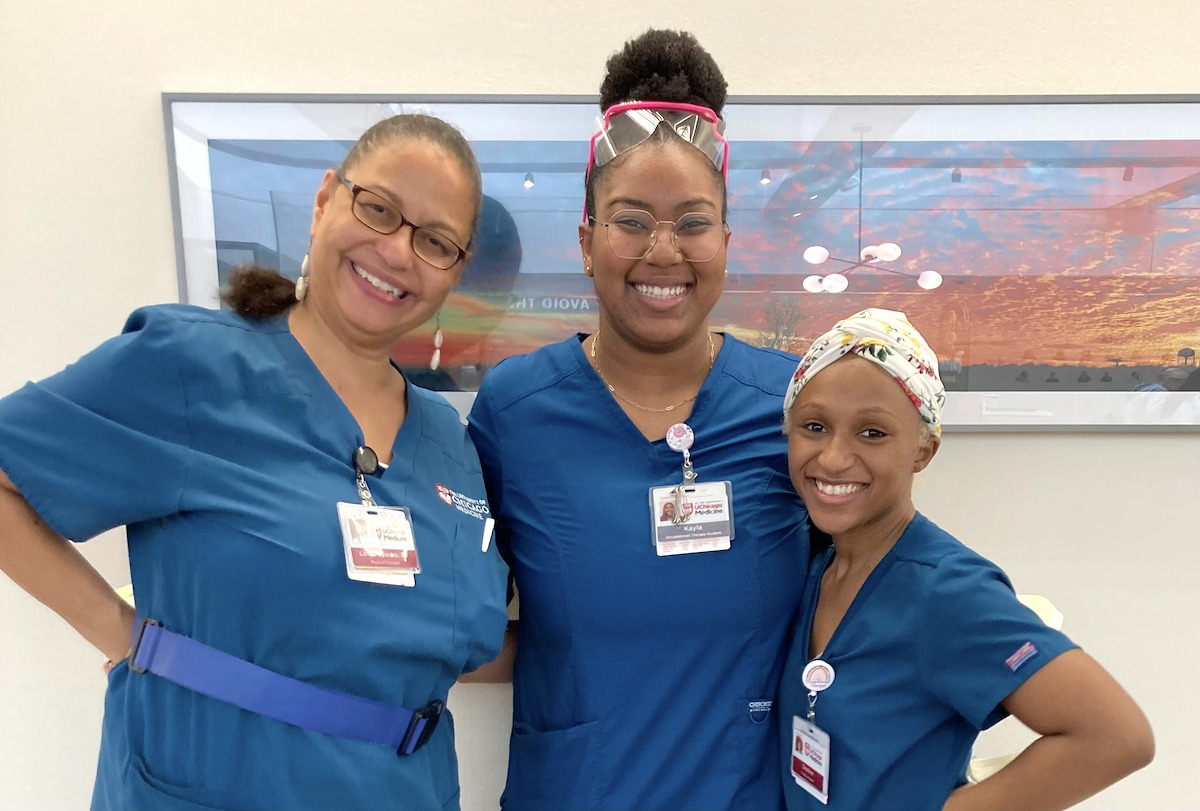Student Blog
Life Hacks
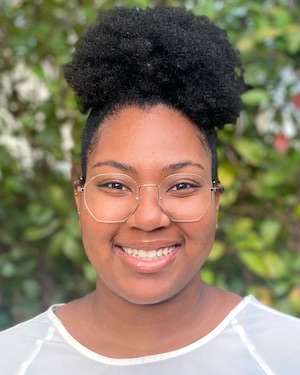
Imposter Syndrome . . . Is That You? ⟩
March 31, 2022, by Kayla
Community Diversity Life Hacks
As a part of my PP-OTD journey, my residency is a year long. In the grand scheme of things that isn’t a long time, but when you’re in the middle of it, you start to feel the time moving by. You have time to think about the past, where you are, and most terrifyingly . . . the future. As I’ve started thinking about my future, for the first time in a long time, there is so much uncertainty. In undergrad I knew, OT school was next. In the MA program, I knew my OTD was next. But now that I’m entering the last 6 months of residency, the next chapter has yet to be written and I’m definitely feeling the pressure.
If I could put words to what I’m experiencing, the definition of imposter syndrome would sum it all up quite nicely. For me, imposter syndrome manifests as the feeling that everyone around me can sense that I’m “faking it until I make it” and is judging me . . . big time. Honestly, this is a new experience for me and it’s been causing a lot of unneeded worry.
For most of my academic career, I was blessed enough to avoid seriously feeling the effects of imposter syndrome. As a student in undergrad or in the MA program, we were all in it together *insert High School Musical here* and it felt like everyone else was just as confused and doing equally as much soul searching as I was. But now, in residency, where I’m working with more experienced practitioners and with other students who have different strengths than me . . . those thoughts are starting to creep in. And as a result, I found that when I make mistakes, as any human does, I start feeling super down on myself and questioning my ability to be a good OT.
After taking some time to sit with my feelings and coming to realize what has been going on, I found that reframing my thoughts and experiences helped sooooo much. Taking the time to validate the work that I’m putting in, acknowledging the growth that I’ve experienced over the past six months, and reassuring myself that I am doing my best and that’s what matters.
Coincidentally, in the midst of feeling all of the feels, I got a text message from one of the senior physical therapists at my residency site to meet up and eat lunch with her and the other OT/PT/PTA students of color! We sat and talked about our unique experiences and it really helped me feel heard, and reassured me that: 1) I was not the only person to ever feel like this, and 2) that by no means do these feelings last forever. You can say that I found my little communOT/PT 😊 This came at the seemingly perfect time; more than anything it was a reminder that that this too, shall pass.
⋯

Where Did the Time Go? ⟩
March 20, 2022, by Marvyn
Life Hacks School/Life Balance
And just like that Spring break is over. Have you ever wondered where the time went? It feels so elusive but also always so present. At one point you feel like you have had an abundance of it, but now it feels like I have so little time.
I remember back when I started in the Post-Professional Master’s program last August, my mind was comforted by the fact that I have a lot of time to spend in this program and that I will have so much to learn and experience. But while the latter remains to be true, I feel like I am now running out of time. It feels like I just landed in Los Angeles yesterday but here we are. The one year has already flown by and we are already in the last few stretches before commencement! What is this sorcery??
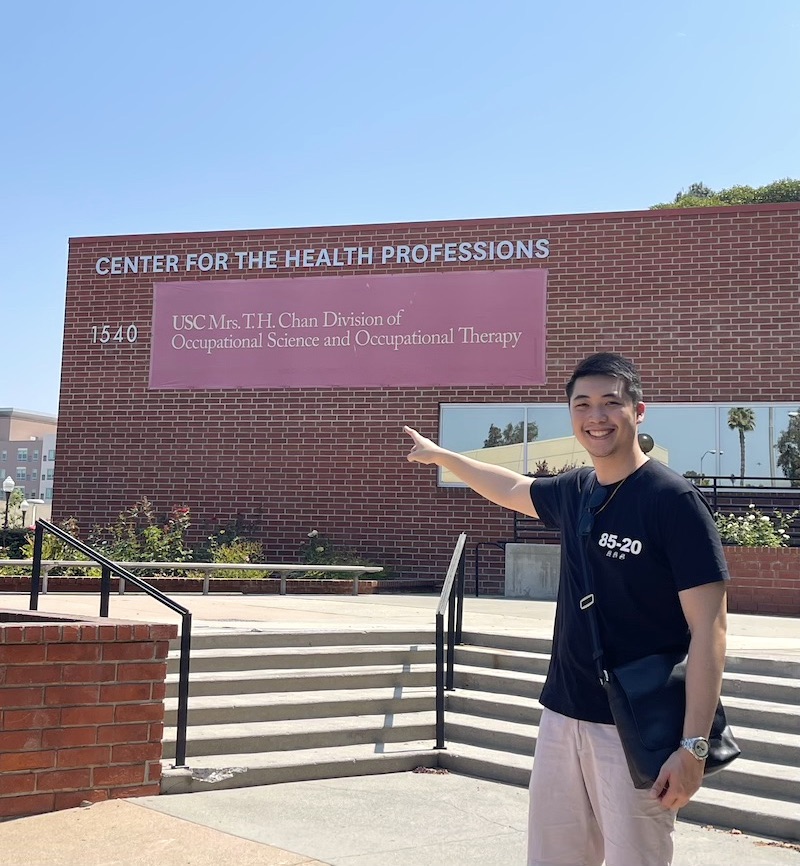
My first ever visit to USC Chan!
Can you find your time back?
All my life I knew time was precious. If you knew me, I have had a love-hate relationship with time. Every time someone asks me, “If you gain a superpower, what would it be?” My response will always be to be able to control time. I find that whenever I feel like I’m chasing after time and making the most out of my experience here at USC, I find myself creating the best memories. You have this sort of pressure to do the best and to feel the best. At least, that’s how I see it personally. Maybe, as you read this, you feel kind of the same way too! But there is also a part of me that wishes I had more time, that I can freeze/rewind and do more. Could I ever find more time?
Look back. Reflecting on your experiences in the past is your own trophy. Whatever you have done and haven’t done, these are the points that you can live by in the present. Personally, I have had the best year of my life being here at USC. I made so many new friends and lifelong connections, and I had the best experiences and memories that I will never trade anything for the world. When I look back at what I have done so far in my time here at USC, I have never been prouder with what I was able to do, and I look forward to what I will be doing in the future.
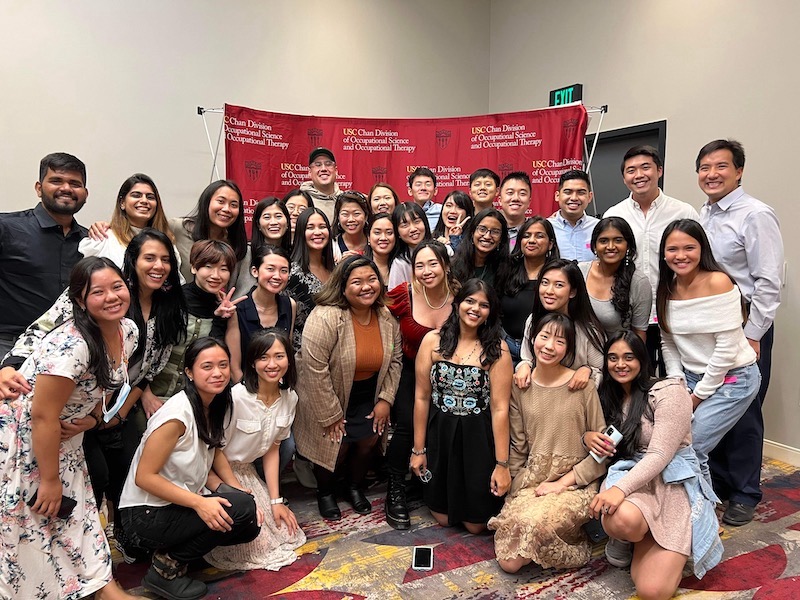
Making memories with my PP-MA class on our first Friendsgiving! Shoutout to Global Initiatives and everyone else involved!
Living in the present. While it is okay to feel like you’re chasing after time and that you have so much more things you want to do, I’ll use this opportunity to remind myself that I should live in the present experiences and bask in its warmth and joy. I have been so worried about the time I have left and the things I want to do that I forget sometimes to enjoy the things that I currently have! Like everyone says, time is something you never get back. So, while you have it, enjoy it.
Look forward to what’s to come. Now, this might contradict what I have already said but having something to look forward to is a great thing to think about as well. Maybe, in a sense, creating an objective to work towards is beneficial for your time as well! If you think about it, if you have a goal you want to achieve with the “limited” time you have left, it allows you to seize each day with the best memories.
But also, don’t get me wrong, I don’t want to pressure anybody to always do something. Sometimes doing nothing and really taking your time is completely fine as well! There is a fine line between healthily pressuring yourself while keeping your sanity in the midst of every choice you have.
This blog post has been, in a way, cathartic for me because of the current pressure I am feeling with the limited amount of time I have left here in my program. I am comforted by the fact that I have reflected upon my experiences and came up with the three points I mentioned. If you are feeling almost the same way as I have, I hope this helps you too.
⋯

Kayla’s Declassified Spring Survival Guide ⟩
March 8, 2022, by Kayla
Life Hacks
Let’s set the tone for this blog. Ready? Close your eyes, picture a perfectly sunny Southern California day, a beautifully organized planner with all of your assignments for the month, a nice cold iced coffee, and a feeling of finally settling into your routine for the semester. Blissful, right? But then you remember, you’re still looking for an external residency site. I don’t know, maybe I was alone in feeling continual stress in the background surrounding finding an external residency during spring semester (but something tells me I probably wasn’t). And something else tells me that you all might be feeling something similar if you are at this point in your journey towards the PP-OTD program.
Luckily, I’ve already been through it so I can share with you some of the things that I learned while reaching out to possible external sites! Tip One: I cannot stress enough is to take the time to sit down and REALLY have a heart-to-heart with yourself and decide what you want out of your residency experience. One of the biggest pieces of advice I can give is to find a residency that speaks to your why. It makes all of the difference when you are reaching out to sites. Not only can they ~feel~ the difference if you are walking in your truth, but I think it will give you more of a confidence boost and help you fall into the right situation! If you seek to find a residency that speaks to your why, I promise, it is so much easier to portray your passion and ultimately, what you will bring to that site as a resident!
Tip Two: Hearing “no”, is okay! In fact, the words “no”, “thank you, however”, and “unfortunately” shaped my spring and summer of 2021. While it was definitely not fun to hear at the time, each time an opportunity didn’t work out, it was just another chance for me to reframe, refine, and re-try! Self-reflection was HUGE for me at this time. I was always thinking about how to make myself stand out as a candidate and refine my elevator speech (oh, the infamous elevator speech) about the PP-OTD program even more compelling and intriguing to potential residency sites.
Segueing into tip three . . . . This is a process of finding an external residency site. I chose those words intentionally, it is a process. For some, it may be quick, for others it may require a little bit more time, but enjoy the process! Enjoy YOUR process.
This last tip, I cannot stress enough. Use your resources! Former residents, program faculty, *cough, cough* yours truly, and literally anything else you can think of. If you have to complete an interview, set up a mock interview. If you have to write personal statements, have your peers and a trusted faculty member look them over and give you feedback. While these opportunities may seem scary or seem like more work at the time, they truly help make us better in the long run. I think this would be a great place to share some wise words from a mentor, “No one has ever been too prepared.”
So, now let’s go back to that scene we set at the beginning. Picture that perfectly sunny Southern California day, your perfect planner, that pristine iced coffee, and that feeling of peace after finally settling into your routine for the semester. But this time, imagine yourself with a feeling of confidence replacing that stress about finding an external residency. Confidence in yourself and confidence in your plan; you’ve got this!
⋯

Taking That Leap of Faith ⟩
February 11, 2022, by Marvyn
Admissions International Life Hacks Living in LA
This time last year, I took a leap of faith. I was contemplating for such a long time if I were to apply for the Post-Professional Master’s program or not. It took me a couple of factors before I could hit the submit button. Allow me to elaborate.
A Master’s program is so daunting! Can I even do it??
If you have read my previous blog about my undergrad experience, I am not a perfect student. If anything, I’m faaaar from being perfect. Not that imperfection is unacceptable, but taking a program that is a Master’s level is A BIG DEAL. It’s a huge step further than a bachelor’s degree. My mind, when I was thinking about applying, was spinning in circles. I was asking over and over “Do you think you can handle the challenges?” “Are you capable to take on this huge step in your life??” AND A BUNCH MORE.
What helped me go through it is to reflect on my “WHY”. I knew that I wanted to learn more about occupational therapy, most specifically at the best university for the program. So, instead of thinking of the intimidation of a big dream like this coming to a reality, I focused on the goal. Eyes on the prize. I wanted to become more than what I am now, and that I am willing to go through all hoops and hurdles to get there. So ultimately, learning how “to let go and to believe in myself” is the best way to go. Trust me, you CAN do it.
What would my family and peers think of me just abandoning them for so long??
It varies from person to person, right? It’s true, I am privileged to say that my family is my best support system ever. Even though I knew that this is a very big dream for me to achieve, I am lucky enough to have a family that supports me in any of my dreams. The same can be said about my friends too! As much as I thought they would be disappointed in me, they all ended up being my biggest cheerleaders.
Believing in yourself is one thing but having someone else believe in you too helps a lot. Trust me when I say that support system doesn’t have to be high maintenance. You can have relationships in life that can propel you to do great things without holding you back. Stick with them and you’ll feel confident in taking such a huge endeavor such as this.
I’ve never lived outside my home country for this long, HOW CAN I SURVIVE?!
Living in a foreign country for a long period of time really is a game of survival. There’s really no way to sugarcoat it. But, I will let you in on a not-so-secret secret: It’s definitely do-able. I have had many anxiety-driven nights back at home thinking about things to prepare, anticipate, and worry about living in LA for so long. But once you find out where you will be staying and mapping out notable places to do essential stuff, you are pretty much set! If there’s any advice I can give you on this problem, it’s that: Once you set your feet on the ground, find as many people as possible, especially in the Chan community. You’ll find quickly that there are a bunch of people who can help you survive the LA grind. I mean, look at the last blog I wrote about things to do in LA! I wouldn’t have been able to do all that had I not have the friends I newly found throughout this journey!
Circling back, I definitely think these factors have been major themes that worry me before I hit the SUBMIT button in my application. But like I said, I took that leap of faith. I closed my eyes, took a deep breath, whispered a little prayer, and let my finger go heavy on my laptop’s trackpad. I feel the vibration on my finger signifying a click and the rest is history!
At the end of all this, I’m so glad I took that leap. I cannot express how thankful I am to myself for grasping the courage and going for it. It really takes some nerve to be able to trust the process and let Destiny do their work. It’s only a matter of time.
If you’re still contemplating or having any questions with your application process, you can always contact me (and my other co-ambassadors) at .(JavaScript must be enabled to view this email address).
⋯

Self Care is Health and Health is Wealth ⟩
January 25, 2022, by Silvia
Life Hacks Living in LA
Listen, I know it is admission szn and I will get back to talking more about being first gen, but today is not the day.
Today we’re talking self-care because it is my birthday and I am self-caring all day. I turn twenty-something and normally I would be traveling for my birthday, but birthdays have looked different the last couple of years because #COVID and #GradSchool. It’s hard and stressful to keep up with both. Since starting the master’s program I have been on the “go-go-go” mindset, rarely taking time for myself, but this year I am manifesting better mental health, well-being, and happiness. I am making an effort to invest more time in myself to reset and refill my cup before hitting burnout.
So with that said, let me share with you my top self-care activities.
Watching The Beach Sunrise
This one is probably my favorite one — exceptforthewakingupearlypart — because it truly helps me ground and recenter myself. Sitting in the sand, waiting for the sun to come up, and listening to the waves gives me a sense of peace and fills me with so much gratitude.
I am very future oriented, constantly thinking about tomorrow, and TBH I hate it because it takes away from appreciating where I am at right now. You know the “I’ll be happy when” syndrome. That’s exactly what I’m referring to: I’ll be happy when ______ (I get into the master/OTD program; I pass the comp/NBCOT exam; I graduate; I get my first job . . .). We forget that the moment we are living in right now was once the blank we filled in. So today, I chose to be happy and embrace the fact that I am exactly where I should be.

A Malibu Sunrise
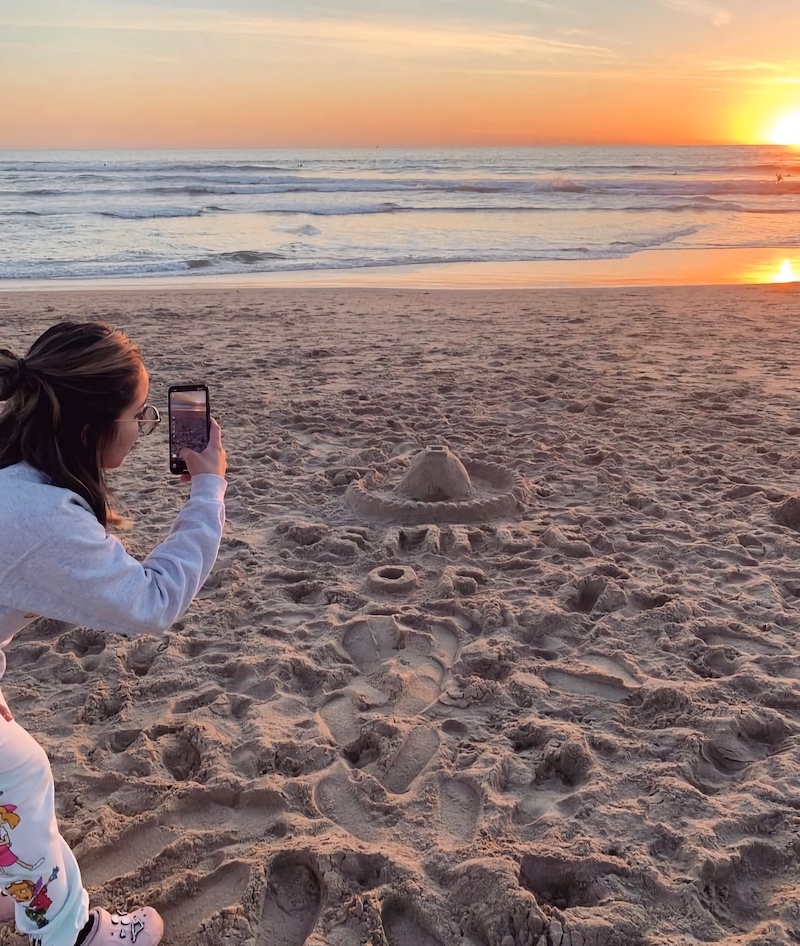
If you don’t make it to sunrise, there’s always sunset 😊
Tips for this self-care activity:
- Go to bed early so you actually wake up to make it to the beach for sunrise
- Bring a book to read or do some mindful coloring
- Grab a hot cup of coffee or tea on the way + dress cozy
Working out
Ok I love this one too — excepttheworkingoutpart — because when you look good, you feel good. I like to start and end my day with a workout. My AM workout is equivalent to a coffee lover’s first sip of coffee in the morning, it wakes my body up and gets me in a good mood. My PM workout helps wind me down after my long days. And in case you were dying to know, I am a big fan of the Apple Fitness HIIT and cycling workouts.
P.S. If you have a workout playlist, please share it.
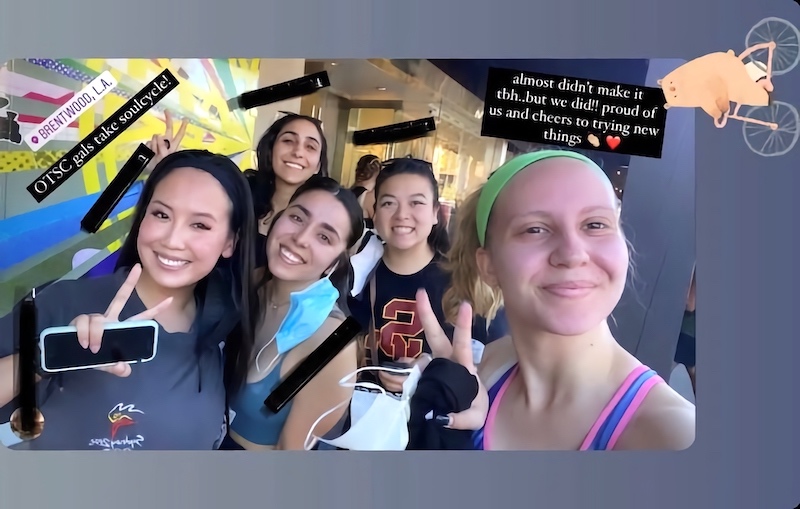
Working out is funner (yes, I know that isn’t a word) with friends; we did a cycling class at SoulCycle. Pictured: Teresa Pham, Me, Mariamme Ibrahim, Alyssa Matlosz, and Vanessa Elshamy
Tips for this self-care activity:
- Try something new/switch it up (let me tell you, I never thought I’d love cycling)
- Put a picture of JLO on your vision board
- Checkout Alyssa’s Zumba class
Treating Myself
Also love this one — exceptthespendingmoneypart — because who doesn’t like to treat themselves?
I must say though, this one can be tricky because it’s really easy to get caught up in the “I deserve it” mindset. And don’t get me wrong, you absolutely do deserve it; however, treating yourself to things only every now-and-then makes them that much more satisfying. OK FINE, this is what I keep telling myself so that I stick to my 2022 budgeting goal — but is it working? Yes. At least January is off to a good start. Now, instead of getting my Vietnamese sweet coffee 3x a week, I save it for the weekend, and in stead of buying a smoothie or acai bowl after my workouts, I make one at home. #GROWTH.
(Obviously except today because it’s my birthday and I’m treating myself.)

Teresa treating me to a true Vietnamese sweet coffee
Tips for this self-care activity:
- Make a “treat yo self” budget
- Remind yourself you have food/coffee at home during the week
- We’re here for a good time not a long time; if you need to treat yourself, please do
So in conclusion, whether it’s your birthday or not, remember to practice self-care because . . . self-care is health and health is wealth.
⋯






